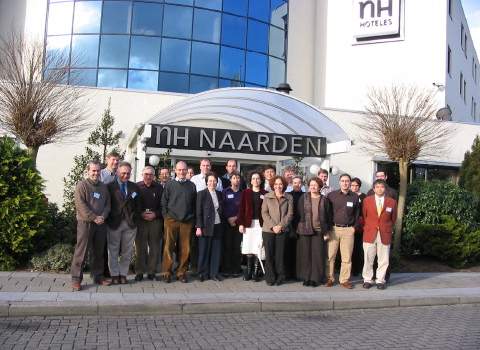Congenital Muscular Dystrophy (CMD)
- Number 133
- Date 21 January 2005
The ENMC Consortium on Congenital muscular dystrophy (CMD) held its 9th meeting in Naarden during the weekend of the 21st-23rd January 2005. It was attended by 23 participants from 9 countries, including France, Germany, Japan, Italy, The Netherlands, Spain, Turkey, United Kingdom and USA. The participants were basic scientists with biochemical, cell biology and molecular biology background, and clinicians and muscle pathologists, all sharing an established expertise in neuromuscular disorders or in muscle cell biology.
Congenital muscular dystrophies (CMD) are a heterogeneous common group of disabling neuromuscular disorders usually inherited as autosomal recessive conditions. Affected children present with muscle weakness and hypotonia at birth, or within the first six months of life and motor development is delayed. The severity and progression of the disease is very variable and dependent on the disease subtype. Brain involvement in the form of mental retardation and abnormal formation of different parts of the brain is a feature of several forms of CMD.
A substantial advance in our understanding of CMD derives from the identification of novel genes responsible for their development. Currently mutations in 11 genes have been identified, and recent classifications of CMD take into account the primary metabolic defect and/ or the subcellular localisation of defective proteins. The present meeting focused on 2 separate groups of CMD syndromes characterized by deficiency in proteins located in similar cellular structures known as the Endoplasmic Reticulum (ER) and the Golgi apparatus. While pathogenesis of some of these conditions is different, this workshop focused on better understanding the localisation and function of these cellular structures during different stages of muscle maturation. One session was therefore devoted to general cell biological aspects of the ER and the Golgi apparatus in muscle; this was followed by a session focused on Rigid Spine Syndrome, a condition due to mutations in the Selenoprotein N, an ER resident protein. The remaining sessions were all devoted to the further characterisation of 5 forms of CMD due to mutations in putative or demonstrated glycosyltransferases (i.e. proteins involved in adding sugar to dystrolgycan), proteins which are localised in either the ER or the Golgi apparatus, or both.
A remarkable widening of the spectrum of the conditions due these 6 gene defects was presented by various participants, together with novel data regarding the spectrum of the pathological changes in muscle and brain. A number of likely novel conditions in which the primary genetic defect is not known yet were presented. Collaborative diagnostic strategies were discussed, together with novel therapeutic approaches to animal models. A number of collaborative studies were agreed.
An extended report of this meeting has been published in Neuromuscular Disorders. Please click here to view the full report.
Prof. Francesco Muntoni, London, UK
Prof. Thomas VoitEssen, Germany
Chairpersons, CMD consortium

ENMC
Lt. generaal van Heutszlaan 6
3743 JN BAARN
The Netherlands
+ 31- 35-5480481
enmc@enmc.org
We may request cookies to be set on your device. We use cookies to let us know when you visit our websites, how you interact with us, to enrich your user experience, and to customize your relationship with our website.
Click on the different category headings to find out more. You can also change some of your preferences. Note that blocking some types of cookies may impact your experience on our websites and the services we are able to offer.
These cookies are strictly necessary to provide you with services available through our website and to use some of its features.
Because these cookies are strictly necessary to deliver the website, refusing them will have impact how our site functions. You always can block or delete cookies by changing your browser settings and force blocking all cookies on this website. But this will always prompt you to accept/refuse cookies when revisiting our site.
We fully respect if you want to refuse cookies but to avoid asking you again and again kindly allow us to store a cookie for that. You are free to opt out any time or opt in for other cookies to get a better experience. If you refuse cookies we will remove all set cookies in our domain.
We provide you with a list of stored cookies on your computer in our domain so you can check what we stored. Due to security reasons we are not able to show or modify cookies from other domains. You can check these in your browser security settings.
These cookies collect information that is used either in aggregate form to help us understand how our website is being used or how effective our marketing campaigns are, or to help us customize our website and application for you in order to enhance your experience.
If you do not want that we track your visit to our site you can disable tracking in your browser here:
We also use different external services like Google Webfonts, Google Maps, and external Video providers. Since these providers may collect personal data like your IP address we allow you to block them here. Please be aware that this might heavily reduce the functionality and appearance of our site. Changes will take effect once you reload the page.
Google Webfont Settings:
Google Map Settings:
Google reCaptcha Settings:
Vimeo and Youtube video embeds:
The following cookies are also needed - You can choose if you want to allow them:
You can read about our cookies and privacy settings in detail on our Privacy Policy Page.
Privacy Policy